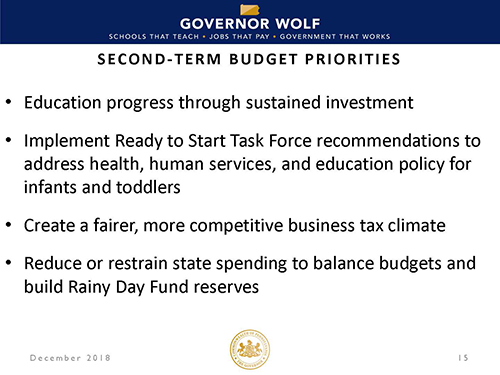On Tuesday, Budget Secretary Randy Albright gave the mid-year budget briefing (slides available here) for the 2018-19 budget. If you’re expecting a repeat of the Wolf Administration’s tax-and-spend rhetoric from 2015, you may be surprised. Here are the key takeaways.
What I liked
- Albright celebrated policy change that helped control spending—all of these changes stemmed from solutions supported by the Commonwealth Foundation:
- Limited spending growth in 2018-19 budget.
- Strong economic growth and state tax revenue growth (stemming in part from federal tax reform).
- Criminal justice reform resulting in fewer prisoners (and reduced crime).
- Elimination of the Capital Stock and Franchise Tax.
- Movement to a student-based funding formula.
- Pension reform that reduces taxpayer risk.
- Wolf’s “Second Term Budget Priorities” take some cues from Commonwealth Foundation’s budget recommendations.

- "Create a fairer, more competitive business tax climate" sounds like a state tax reform. We may differ in the way to achieve a better tax climate, but there is general agreement our corporate tax structure makes Pennsylvania uncompetitive. The recent Tax Foundation report outlines ideas to make Pennsylvania more attractive to businesses.
- "Reduce or restrain state spending to balance budgets and build Rainy Day Fund reserves." Indeed, spending has been growing faster than taxpayers’ ability to pay. Enacting the Taxpayer Protection Act would be a good start to restraining the growth of state spending.
What I didn’t like
- There will be cost overruns requiring “supplemental appropriations” in the Departments of Human Services and Corrections. In other words, spending will be higher than the General Assembly approved in June 2018. While the budget may still be balanced thanks to tax revenue growth, this isn’t good fiscal practice.
- The presentation implied Gov. Wolf will again call for a natural gas severance tax, on top of the impact fee and other taxes the industry pays. Here’s why that’s a bad policy.
- Wolf continues to unilaterally enroll people in the General Assistance program—a welfare program eliminated by the legislature in 2012. While the Supreme Court ruled that 2012 law violated constitutional requirements on original intent of legislation, they didn’t order the governor to restart the program; that was Gov. Wolf’s decision. While the administration estimates the program will cost “only” $25 million next year, the Department of Human Services should focus on connecting individuals with the resources they need to become independent, instead of celebrating when more people can enroll in welfare.
What I didn’t hear
While Albright suggested the outlook for next year wasn’t as bad as the IFO projected—due to more optimistic revenue projections, measures to control spending, and a lower estimated cost for General Assistance—he didn’t offer any hints how the governor proposes filling the gap.
Specifically, questions remain how to address:
- One-time revenue sources used to fund human services (welfare) expenses in 2018-19.
- New debt payments, Medicaid costs, and state police costs that the state will have to begin paying (or move to the General Fund) next year.
As I wrote previously, Gov. Wolf campaigned on the fact he wouldn’t raise taxes in a second term, and it’s possible to close that gap without tax increases—but only with a plan to control spending growth and prioritize the use of taxpayers’ money.
RELATED : TAXES & SPENDING, GOVERNMENT DEBT, PENNSYLVANIA STATE BUDGET





